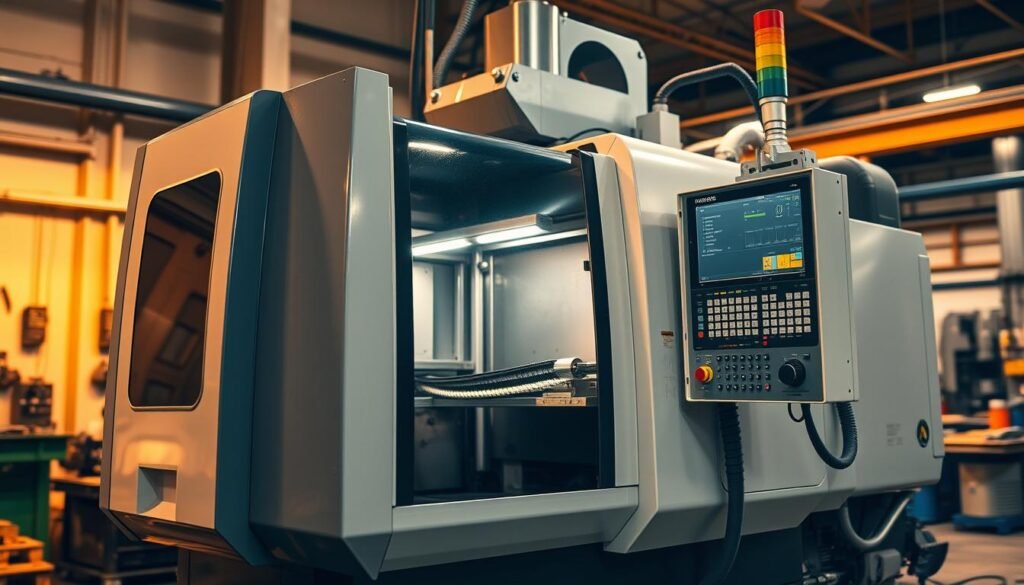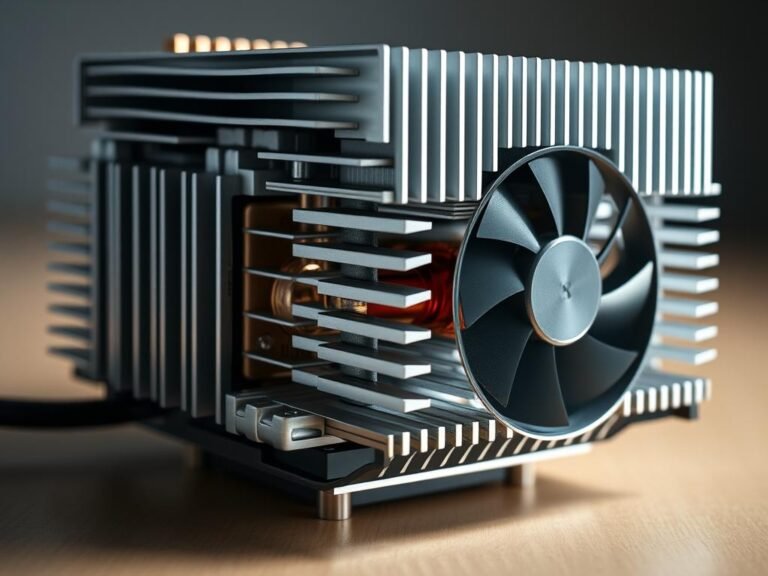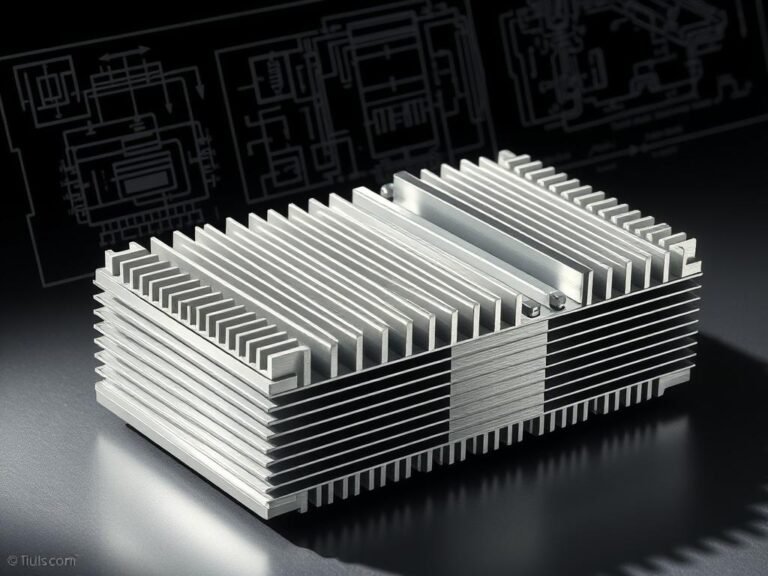The CNC machine revolutionizes the modern manufacturing industry through precise computer-controlled machine tools. This innovative technology enables highly accurate numerical control of production processes and transforms the way industrial manufacturing works today.
A CNC machine is a computer-controlled manufacturing system that performs complex machining tasks with exceptional accuracy. By combining software and mechanical components, these machines can precisely process various materials such as metal, wood, and plastic.
The core of a CNC machine lies in its ability to convert digital design data directly into precise mechanical movements. This allows for highly efficient and error-free production in various industrial applications.
Kernel insights
- CNC machines utilize computer-controlled numerical control
- Enabling precise and automated manufacturing processes
- Reduces human error rates
- Increasing production efficiency and accuracy
- Applicable in various industries
Automation through CNC machines
CNC machines have revolutionized industrial manufacturing. Automation in production technology allows companies in the United States to significantly increase their production efficiency while minimizing human error sources.
- Precise workpiece manufacturing without manual intervention
- Continuous 24/7 production
- Significant reduction of human errors
Reduction of human errors
Traditional manufacturing methods are prone to human inaccuracies. CNC machines eliminate these vulnerabilities through computer-controlled precision. Each workpiece is manufactured exactly according to specified parameters, minimizing errors.
Efficiency improvement
Automation greatly increases production efficiency. CNC machines can perform complex tasks faster and more accurately than human workers. They operate consistently with the highest precision, enabling a significant increase in productivity.
“Modern automation is the key to competitive manufacturing”
Companies that rely on CNC technology benefit from shorter production cycles, lower scrap rates, and optimized manufacturing processes.
Precision of CNC machines
CNC machines revolutionize modern manufacturing technology through their exceptional precision manufacturing. These advanced systems enable micrometer-level machining, far surpassing traditional manufacturing methods.
The core strength of these machines lies in their ability to produce complex geometries with an accuracy that is hardly achievable by humans. Some key advantages include:
- Extremely precise machining up to micrometer accuracy
- Reproducible results with minimal deviation
- Ability to manufacture highly complex structures
High accuracy in manufacturing
Modern CNC machines achieve precision levels that were previously unthinkable. Through computer-controlled movements, they can machine workpieces with an accuracy of a few micrometers, making them indispensable for highly specialized industries in the United States.
Complex geometries and manufacturing techniques
Micrometer-precise machining enables the creation of workpieces with extremely complex geometries. Whether in medical technology, aerospace, or electronics industries in the United States – CNC machines create shapes that cannot be realized with conventional methods.
Precision is not just a property but the key to modern industrial innovation.
Flexibility of CNC machines
CNC machines revolutionize modern manufacturing technology through their unique flexibility. Flexible manufacturing allows companies to respond quickly and precisely to different production requirements.
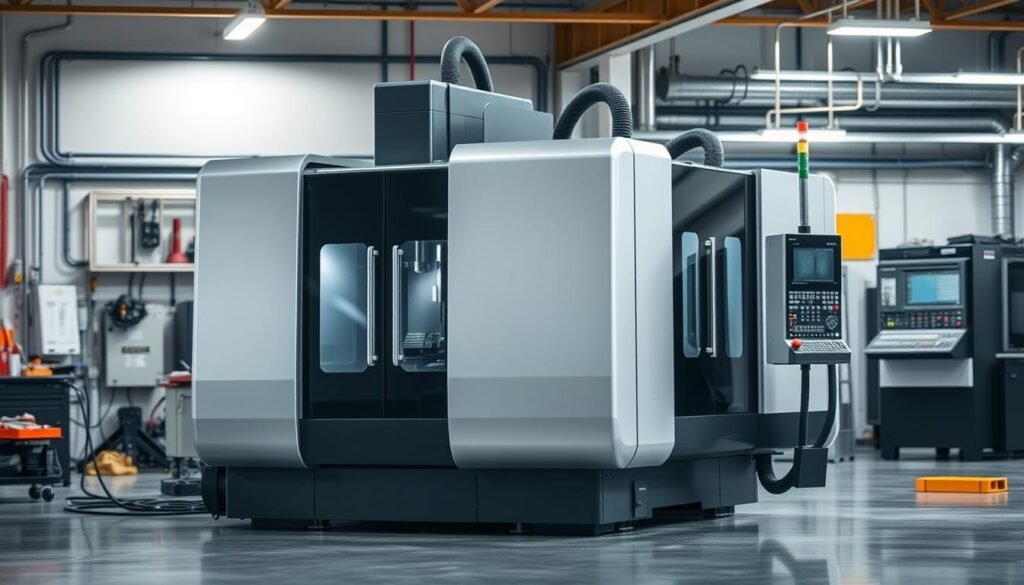
Versatile programming
CNC programming forms the core of the flexibility of modern manufacturing systems. Through intelligent software solutions, companies can:
- Quickly adapt and optimize programs
- Implement complex processing steps in the shortest time possible
- Seamlessly restructure production processes
"The flexibility of a CNC machine defines a company's competitiveness in the modern industry."
Different processing tasks
Multifunctional processing allows manufacturing companies to handle a variety of tasks with a single machine. This reduces setup times and significantly increases overall efficiency.
The adaptability of modern CNC machines allows for precise machining in areas such as metalworking, woodworking, and prototype creation – all with minimal setup time.
Applications of CNC machines
CNC applications play a crucial role in modern industrial manufacturing. The technology has established itself as a key element for precise and efficient production processes across numerous industries. Industry-specific CNC solutions enable highly precise and flexible manufacturing methods.
Metalworking: Precision at the highest level
In metalworking, CNC machines set new standards. They enable complex machining processes such as:
- Precise milling of metal parts
- High-precision turning of components
- Exact drilling and cutting
Woodworking: Creativity meets technology
The woodworking industry benefits greatly from CNC technologies. Complex designs and millimeter-precise cuts are made possible by these machines.
Electronics industry: microscopic precision
CNC machines revolutionize electronics manufacturing by:
- Manufacturing circuit boards
- Precise processing of microcomponents
- Highly precise manufacturing processes
Aerospace: highest quality standards
In this high-tech industry, CNC machines are indispensable. They guarantee absolute reliability in the production of complex components with strictest tolerances.
Components of a CNC machine
CNC machines are complex systems composed of various precise CNC components in mechanical engineering.
The basic structure of a CNC machine includes several critical elements that work together to ensure highly accurate machining processes.
Mechanical basic components
The mechanical components form the backbone of every CNC machine. They consist of:
- Sturdy machine bed
- Precise guide rails
- High-performance drive systems
- Spindle units
Tool magazines and automation
The automatic tool changer is a crucial feature of modern CNC machines. These magazines enable quick and precise tool changes during the machining process.
| Component | Function | Meaning |
|---|---|---|
| Tool magazine | Stores various tools | Increases flexibility |
| Tool changer | Automatic tool selection | Reduces setup times |
| Control unit | Coordinates tool changes | Ensures precision |
The integration of these components makes CNC machines indispensable tools in modern manufacturing processes.
Programming of CNC machines
CNC programming forms the core of modern manufacturing technologies. It enables precise and complex machining processes through specific control methods.
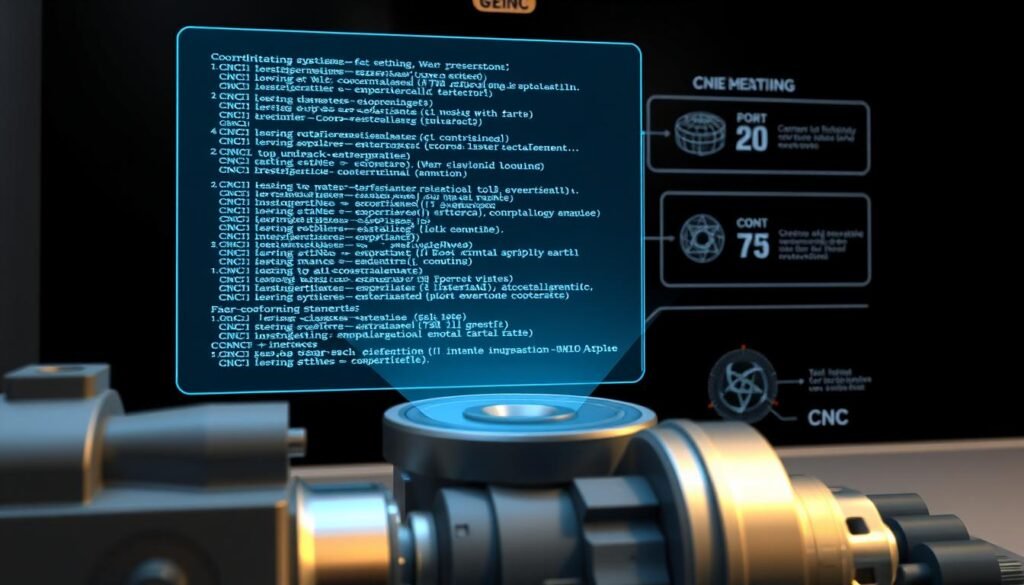
Modern manufacturing companies use advanced CNC programming techniques to produce highly precise workpieces. The key lies in mastering G-code language and powerful CAM software.
G-Code-Sprache
G-code is a standardized programming language for CNC machines. It enables precise control of:
- Tool movements
- Processing speeds
- Positioning instructions
Movement and speed instructions
Every CNC programming requires detailed instructions for movement sequences. Programmers define precisely:
- Directions of movement
- Speed limits
- Coordinate positioning
| G-code command | Function |
|---|---|
| G00 | Positioning with rapid traverse |
| G01 | Linear interpolation |
| G02/G03 | Circle interpolation |
The use of modern CAM software significantly simplifies CNC programming. These tools automatically generate precise G-code programs and minimize programming effort.
'Precision begins in programming' – Industry expert
Advantages of CNC machines
CNC machines revolutionize modern manufacturing optimization with their numerous benefits. The technology enables companies in the United States to make their production processes more efficient and precise.
The cost efficiency of CNC machines is evident in various aspects of industrial production. The following are the main CNC advantages in the United States detailed:
Increase productivity
- 24/7 operation possible
- Faster processing times
- Minimal downtime
Ensure repeatability
Guarantee consistent quality across large production runs with CNC machines. Precise programming enables nearly identical workpieces with minimal deviations.
Optimize material efficiency
| Aspect | Improvement |
|---|---|
| Material utilization | Up to 30% reduced waste |
| Precise machining | Minimal material loss |
Reduce manual effort
Through automated processes, companies can deploy highly qualified employees for more complex tasks. At the same time, workplace safety is improved.
CNC machines are the key to modern, efficient manufacturing.
Investing in CNC technology pays off in the long run through lower error rates and minimal waste.
Types of CNC machines
The world of CNC machine types is diverse and complex. Modern manufacturing technologies utilize various specialized CNC applications to enable precise and efficient processing. Multifunctional CNC centers play a key role in industrial production.
CNC-Fräsmaschinen
CNC milling machines are precise tools for processing various materials. They can create complex three-dimensional shapes with the highest accuracy. These machines use rotating tools to cut and shape material.
- High-precision processing
- Suitable for metal, wood, and plastic
- Complex geometric shapes possible
CNC-Drehmaschinen
Lathes specialize in rotationally symmetric workpieces. They rotate the workpiece against a static cutting tool to produce precise cylindrical parts.
| Scope of application | Characteristic |
|---|---|
| Mechanical engineering | Precise Round Parts |
| Automotive | Waves and Axles |
CNC-Bohrmaschinen
These machines are experts in precise drilling and threading. They can drill holes with maximum accuracy in various materials.
CNC-Plasmaschneider
Plasma cutters use a high-energy plasma jet to cut metal plates. They are especially suitable for thick materials and enable fast, clean cuts.
The variety of CNC machine types demonstrates the capabilities of modern manufacturing technologies. Each machine has its specific strengths and applications.
Conclusion on CNC Machines
CNC technology has revolutionized modern manufacturing and plays a key role in digital fabrication. Companies can significantly optimize their production processes and work more precisely by using CNC machines.
The future of CNC technology lies in the intelligent integration of artificial intelligence and machine learning. Industry 4.0 allows manufacturing companies to increasingly network their machines and monitor and control production processes in real time.
Smart factories will use CNC machines that communicate autonomously and can self-optimize. The development is heading towards flexible, faster, and more efficient manufacturing systems that handle complex tasks with minimal human intervention.
The technological advancement of CNC machines will further transform industrial production and create new opportunities for companies to stay competitive and innovative.
